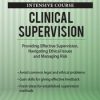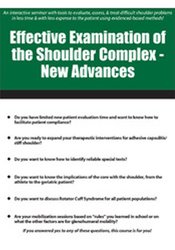Effective Examination of the Shoulder Complex: New Advances – Joe Mullins | Available Now !
$219.00 Original price was: $219.00.$74.00Current price is: $74.00.
Effective Examination of the Shoulder Complex: New Advances – Joe Mullins | Instant Download !
Sale page_https://catalog.pesi.com/item/34173/
Archive: https://archive.fo/FWrwn
Examining the Shoulder
The shoulder has tremendous mobility across four joint structures. This increased mobility can compromise the stability of the scapula humeral complex. Rehabilitation of the shoulder requires a delicate balance between improving soft tissue mobility and neuromuscular control. However, elimination of a patient’s pain does not mean a long-term successful outcome. A good, sound orthopedic screening examines the patient as a “whole” versus as a “joint” or “tissue” diagnosis and will allow the clinician the ability to address present and potential predisposing factors. Many professionals are lacking in these skills or frustrated with the constraints in place due to managed care. Today’s managed care environment often frustrates the clinician by not being able to successfully rehabilitate the shoulder. “Managed care” has a different meaning for the patient, payer and provider. Examination and treatment of the shoulder is challenging to the clinician and made even more difficult when working in a managed care environment. Clinicians often find it difficult to properly heal the patient’s injury while also accelerating the treatment process.
This exciting, interactive, recording is designed to inspire attendees to understand first “what is inside the box, before you can think outside of it.” Advanced critical thinking skills are vital in today’s limited visits and high co-payment atmosphere. The clinician who can properly examine the shoulder by first breaking down the subjective and objective portion of the exam, and then specifically identify what is really important to rehabilitate, will be the clinician who succeeds in meeting the needs of all the players in managed care: patient, provider, and payer. This recording will take you step-by-step, utilizing case studies of very common, complex shoulder problems. You will gain tools to evaluate, assess and treat difficult shoulder problems in less time and with less expense to the patient.
1 review for Effective Examination of the Shoulder Complex: New Advances – Joe Mullins | Available Now !
Add a review Cancel reply
Related products
Ecommerce
NLP & Hypnosis
Ecommerce
Ecommerce
NLP & Hypnosis
NLP & Hypnosis
NLP & Hypnosis












Helena Martin –
a+ | Effective Examination of the Shoulder Complex: New Advances – Joe Mullins